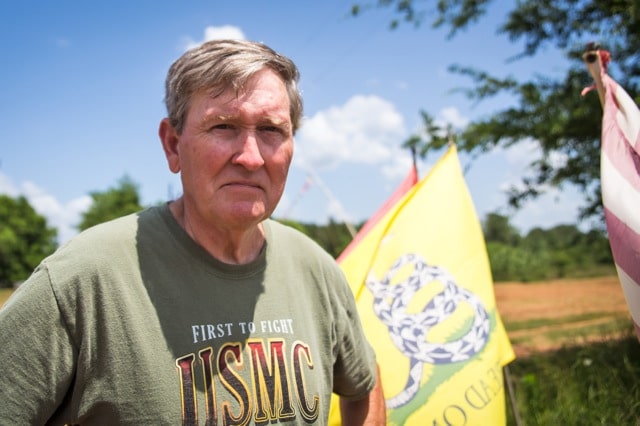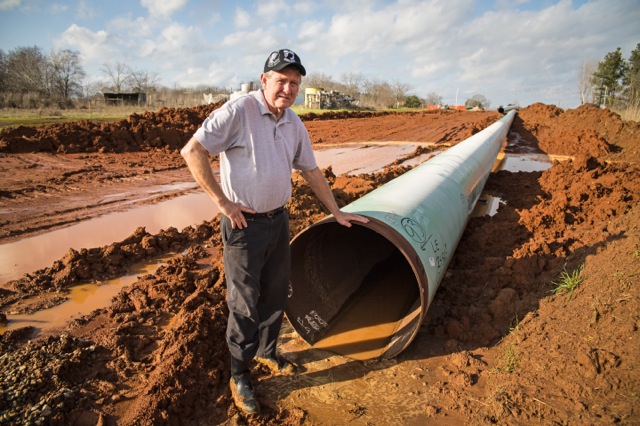If you ever doubted that one man’s stand against the oil and gas industry can make a difference, consider the case of Michael Bishop. The 65 year old Marine veteran, first year medical student, farmer, and partner in a bio-diesel engineering venture, resides in Douglass, Texas, where he is trying to stop the Keystone XL pipeline by means of multiple lawsuits.
His federal case against the U.S. Army Corps of Engineers won an entry of default because the Corps failed to respond in the time allocated by the court. The lawsuit asserts the Corps granted environmental permits to TransCanada Keystone XL pipeline illegally. It could be a short-lived victory for Bishop.
Listen to Michael Bishop explain his lawsuit against TransCanada:
On November 7th, in Lufkin, Texas, the U.S. Army Corps of Engineers filed a motion to vacate the ruling. Bishop, it claims, did not properly serve them in the first place, a move Bishop anticipated. “This is a stalling tactic meant to intimidate me,” says Bishop. Unintimidated, he is ready to file a counter argument against vacating the order asking U.S. Magistrate Judge Keith Giblin to hear his original petition.
This is not Bishop’s first case against the Keystone XL pipeline. He has multiple suits pending. Acting on his own behalf, with no legal training, he started battling the pipeline in 2012 and has learned to meticulously follow the procedures. He is confident he served the Corps as per the court’s instructions and the judge will rule in his favor. However if this case is dismissed, Bishop’s other legal battles against the Keystone XL pipeline will continue in litigation long after the southern portion of the pipeline is operational.
In December 2012, Bishop won a temporary restraining order and injunction against TransCanada to stop building the Keystone XL. Bishop argued TransCanada lied to him and other landowners, promising that the Keystone XL pipeline would transport crude oil, not tar sands oil. The injunction was overruled shortly thereafter but his case against TransCanada is still pending. Texas landowner Julia Trigg Crawford has mounted a similar legal challenge. They both assert TransCanada has not met the criteria to seize land for construction of the pipeline with eminent laws.
Michael Bishop in front of a section of the Keystone XL pipeline being installed on his property ©2013 Julie Dermansky
Bishop’s case against the government asserts the environmental permits to the Corps issued to TransCanada should be revoked on the grounds that the Corps failed to hold public hearings before issuing water-crossing permits.
Bishop argues,
“The Corps yielded to political pressure and expedited the permit in violation of federal environmental regulations. Texans were short-changed by the fast tracking of the Keystone XL‘s southern portion. The state didn’t do the kind of environmental impact study that was done in Nebraska, which resulted in the pipeline being re-routed away from the Ogallala Aquifer. The path of the southern pipeline portion goes through the Texas Ogallala Aquifer, which is also classified as an “ultra-sensitive area” by the U.S. Department of Transportation. Texas was not given equal protection under the law.”
If Bishop wins, the Corps would have to hold the public meetings it skipped before they could continue, which would shut down the pipeline that is scdeduled to begin operating early next year.
The Sierra Club waged a similar legal fight that ended in defeat when the U.S. Court of Appeals for the Tenth Circuit in Denver, Colorado, refused to issue a temporary injunction against TransCanada that would have stopped the construction of the southern half of Keystone XL. As reported by DeSmogBlog, the Court ruled: “The threatened environmental injuries were outweighed by the financial harm that the injunction would cause TransCanada.”
Tom Weis, president of Climate Crisis Solutions, organized a protest against Keystone XL across the street from the White House on November 7th in Bishop’s behalf. The protesters called for President Obama to stop the completion of the southern end of the pipeline. He delivered a petition which was endorsed by Daryl Hannah; Ed Begley Jr., Mariel Hemingway, Lester Brown, Julia Butterfly Hill, Paul Hawken, James Hansen and Debra White Plume, among others.
In an op-ed piece published by Truthout, Weis wrote “Letting TransCanada put the southern route in operation is a classic bait-and-switch. By breaking Keystone XL into northern and southern legs, Obama was able to give his environmental base something it wanted (a “victory” to crow about), while giving TransCanada something it needed (access to port refineries).”
Landowners Against TransCanada Pipeline and Jane Kleeb of Bold Nebraska set up a fundraising site to help Bishop with his legal filings. Tom Weis explains the urgency of this fight:
“Michael’s lawsuits are our last, best hope of extinguishing this 485-mile carbon bomb before it’s too late. His fight is our fight. What this transnational corporate bully is doing to him and other landowners in Texas and Oklahoma could be done to any one of us.”
Bishop points out that he didn’t start this fight but he has every intention of finishing it.
“I’m a United States Marine. I’m not scared of anything. When I’m done with them, they will know that they’ve been in a fight. I may not win, but I’m going to hurt them.”
Photographs and video ©2013 Julie Dermansky
Subscribe to our newsletter
Stay up to date with DeSmog news and alerts







